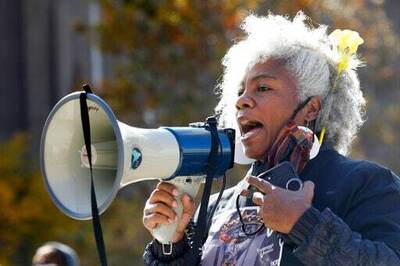
views
The judge in the trial of Derek Chauvin, the former Minneapolis police officer charged with murdering George Floyd, said on Monday he was concerned publicity about the city’s $27 million settlement with Floyd’s family could influence jurors.
Calling the timing of Friday’s settlement announcement “unfortunate,” Judge Peter Cahill of the Hennepin County District Court said he would recall seven jurors seated last week to ask if they had seen news of the settlement and whether it would affect their impartiality.
“I wish city officials would stop talking about this case so much,” the judge said before resuming jury selection on Monday morning. “At the same time, I don’t find any evil intent that they are trying to tamper with the criminal case.”
Chauvin, who is white, was captured in a bystander video with his knee on Floyd’s neck for nearly nine minutes as Floyd, a 46-year-old Black man in handcuffs, cried out for his life. The death ignited global protests against racism and police brutality. The Minneapolis Police Department fired Chauvin and three other officers involved in the arrest the next day.
Floyd’s family filed a federal wrongful-death lawsuit against Chauvin and the city last year. The city called a news conference to announce the settlement, which included emotional comments by Floyd’s brothers and Mayor Jacob Frey.
Eric Nelson, Chauvin’s lead lawyer, said the news was “profoundly disturbing” to the defense.
“By my count, this is the third highly prejudicial press leak or press release that has very suspicious timing, to say the least, and has an incredible propensity to taint a jury pool,” he told the court.
Besides asking to recall the seven jurors already seated, Nelson requested the judge reconsider his request to move the trial to a different county, which Cahill said he would do.
‘ALL OVER THE MEDIA’
Prosecutors from the Minnesota attorney general’s office told the court they had no control over the city’s mayor, council or news media.
“You would agree that this is unfortunate, wouldn’t you?” the judge responded to the prosecutors. “That we have this reported all over the media when we’re in the midst of jury selection?”
Cornell University law professor Valerie Hans, who studies the jury system, said the settlement’s impact could be mixed. Minneapolis’ move to settle may suggest to potential jurors that the city thought Chauvin was in the wrong, she said by email.
“However, the substantial size of the settlement might give people — including jurors, if they hear about it — a sense that the Floyd family has been compensated for the wrong done to their family member, which could lessen the urge to punish Chauvin and the other police officers by convicting them,” she said.
Sarah McKenzie, a city spokeswoman, said city leaders were “following Judge Cahill’s guidance” and declined to comment.
The judge dismissed the first potential juror seen on Monday, who appeared to be a white woman in her 50s, after she expressed surprise at the size of the settlement, saying it suggested the city felt it could not win a civil trial.
Two additional jurors were seated on Monday, bringing the total to nine.
They joined seven jurors seated last week who comprise three white men, one Black man, one Hispanic man, one mixed-race woman and one white woman, according to the court. Cahill has promised the jurors anonymity for the trial’s duration.
The eighth juror, a Black man with a banking background, said he strongly supported the message of the Black Lives Matter movement and that he could be impartial in weighing Chauvin’s conduct.
“I don’t think he had any intention of harming anyone,” he said of Chauvin, “but somebody did die.”
The ninth juror, a white woman in her 50s, said she was a single mother working as an executive assistant. When asked her views on Black Lives Matter, she said that, above all, “all lives matter.”
Chauvin, 44, is charged with second-degree murder, third-degree murder and second-degree manslaughter. He has pleaded not guilty, saying he followed his police training, and has spent much of the trial making pages of notes on a yellow legal pad.
The court plans to have opening arguments commence on March 29. Chauvin faces up to 40 years in prison if convicted on the most serious charge.
Disclaimer: This post has been auto-published from an agency feed without any modifications to the text and has not been reviewed by an editor
Read all the Latest News, Breaking News and Coronavirus News here


















Comments
0 comment